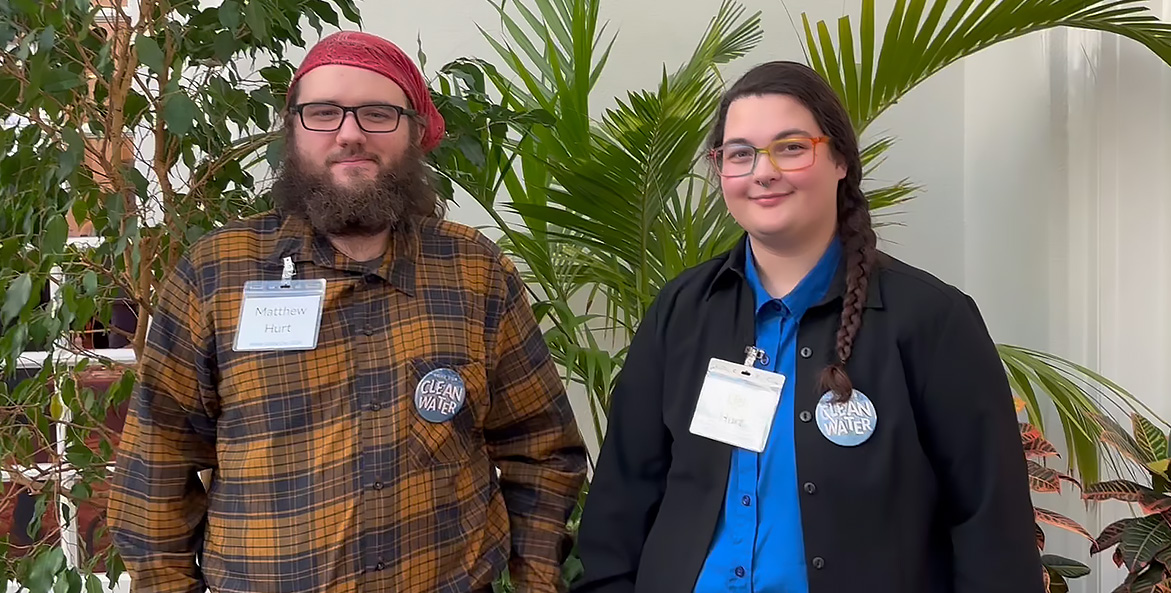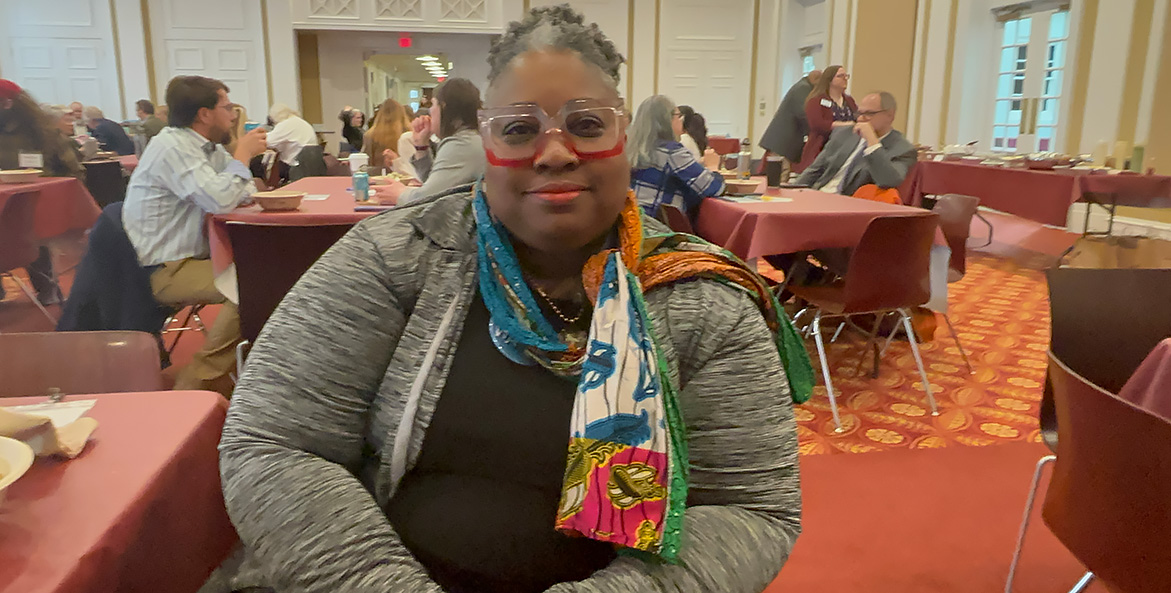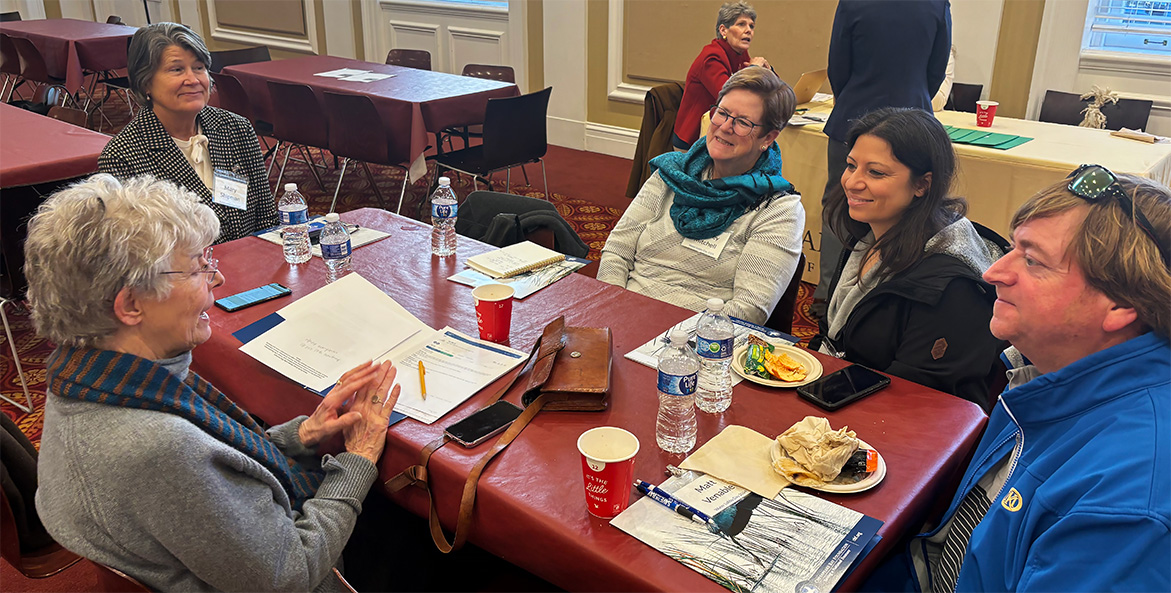Thinking of his three boys playing on a driveway possibly coated with a toxic sealant brought tears to Greg Powers’ eyes.
Powers lives in Bon Air, Virginia, and is the father of twin six-year-olds and a 13-year-old. “I just want to raise healthy children in a healthy environment,” Powers said. “There has to be a way to balance progress and technology and economic development with responsible use of resources so that our children have a safe place to live.”
In late January, Powers urged Virginia Delegate Mike Jones and other representatives to support House Bill 985 banning cancer-linked toxic pavement sealants statewide. The bill has since cleared the House and is now being considered by the Virginia Senate.
Powers wasn’t alone. Ninety advocates from across Virginia joined the Chesapeake Bay Foundation to fill Virginia legislative offices in Virginia's State Capitol and make their voices heard on January 30. It was one of a series of CBF-hosted advocacy days throughout this General Assembly session.
“I believe a crew of many bolsters and provides and supports,” Lynne Evans from Chesterfield County said.
Linking up outside the Virginia General Assembly building with identical “Clean Water” badges, Powers and Evans headed into another meeting with a representative—this time to talk about the loss of tree canopy statewide, a fact that’s alarmed Evans over her 17 years as a landscaper in the county just outside Richmond.
In a span of four hours, delegates from nearly 40 of the 100 house districts and senators from 25 of the state’s 40 senate districts heard about their constituents’ streets continuously flooding, neighborhood trees disappearing, and fear of their children playing and fishing in beloved streams and rivers threatened from pollution.
It wasn’t just parents they heard from—but from the next generation of voters too. A bus loaded with students from the Hampton Roads region talked with Delegate Phil Hernandez, Delegate Ann Ferrell Tata, Senator Christie New Craig, and other representatives.
Water Quality: 'This is my home'
When Lief Hurt first met her husband, Matthew, she gave him one rule. She’d never move out of the mountains.
The couple traveled three and a half hours from Pulaski County, a community of just under 34,000 people set against the Blue Ridge Mountains, to Virginia's state capital that same day.

Matthew and Lief Hurt shared with legislators how pollution has changed the way they and their children experience the outdoors at their home near the Blue Ridge Mountains.
Vanessa Remmers/CBF Staff
“This is my home. I want it to be protected and I want my children to be able to enjoy the same wilderness, the same waters, the same experiences I got to have,” Lief said. “I wanted to come from Southwest Virginia because I feel like we are often overlooked and forgotten.”
Matthew Hurt dreams of a day where he can enjoy fishing in the New River without googling potential harmful health impacts of his catches—whether it be smallmouth bass, striped bass, black crappie, or bluegill. Over the years, the Hurts said, pollutants reaching the waterways from a variety of industries have changed their outdoor experience around their bucolic home.
“Growing up, this wasn’t an issue. You could hunt, you could fish, you could play in the water. Now I need to be careful,” Lief said.
More than 100 miles east in central Virginia, a mother of two boys living in Charlottesville shared Lief’s concern. When her eight-year-old son goes fishing with his granddad or her four-year-old boy splashes in the creeks near their home, pollutants sit in the back of Jacqueline Goodrum’s mind.
“We always do catch-and-release because we can’t be certain that the fish are not contaminated with...toxins getting into the Bay watershed,” Goodrum said.
Del. Katrina Callsen heard Goodrum’s concerns, plus how shopping centers and homes have come at the cost of one of nature’s best pollutant filters: old–growth trees.
“This isn’t just a problem with my neighborhood, but Charlottesville generally. And that’s because we’ve had incredible development over the past decade,” Goodrum said.
Trees give soil more time to absorb rainfall, filter pollutants, and prevent erosion. That makes them one of the most cost-effective ways to prevent polluted runoff from reaching waterways, protect streams, and alleviate floods.
Legislators have responded to a number of tree conservation bills with a historic show of support this session. If passed, local leaders would have broader authority not only to replace trees after they’ve been cut down but also save them during the development process.
Goodrum felt hopeful coming out of her meetings with legislators. Sonya Phillips from Virginia Beach, who met with three representatives, felt the same.

Sonya Phillips of Virginia Beach urged legislators to stop the loss of trees to development.
Vanessa Remmers/CBF Staff
“I see a lot of new development from the Pembroke Mall Town Center part of Virginia Beach,” Phillips said, reiterating how legislators need to stop the loss of trees.
Before heading in to meet with Senate Majority Leader Scott Surovell, students Josephine and Charlotte from Fredericksburg Academy said they’ve watched a few hundred trees cut down to make way for a restaurant and a gas station near their school—and only see more similar plans in the works. By noon, they’d met with five legislators.
Climate Change: 'It broke my heart'
Bruce Dorries, the sole Augusta County resident who traveled to Richmond that day in January, is retiring soon from Mary Baldwin College.
His early career days working for a power company in another state broke his heart, but also helped motivate him to meet with his Republican representatives this General Assembly session.
“All the energy I saw that it took to get the coal out of the ground, transport it across the country, and then burning it,” he said. “Pollution is pollution, and it’s still kind of heartbreaking to see. What is this crazy method of powering our homes and businesses?”
The Chesapeake Bay Foundation is urging legislators to support Virginia rejoining the Regional Greenhouse Gas Initiative (RGGI), a multi-state carbon emission reduction program, as well as legislative efforts to unify the state’s climate resiliency resources and equitably fund community-scale projects that protect against and prevent flooding damage.
For Dorries and other advocates, trees are another essential and effective way to better prepare Virginians for rising seas, more frequent flash floods, rising temperatures, and overwhelmed sewer systems.
“I’m very sensitive to the fact that cities are desperately going to need trees as the temperature rises,” Dorries said.
Eric Fagerholm, a Prince William County resident, agreed. He said he’s seen pollution and rising temperatures drive unprecedented algal blooms and no-swim rules in Lake Montclair 200 yards from his home in recent years.
“Trees have a lot of benefits beyond clean water. It’s about birds, it’s about cooling these heat islands,” he said.
By midday, Fagerholm had checked off his list of meetings. He joined other advocates in loading buses or piling back in cars. For many, the trips home would be hours long.
But it didn’t matter. Their homes, their kids, their environment were worth it.
“We were going to take this rare opportunity to be face-to-face with our legislator,” Lief said.




